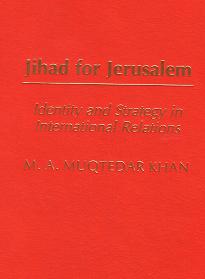Jihad for Jerusalem
 Identity and Strategy in International Relations
Identity and Strategy in International Relations
Jihad for Jerusalem advances a theory of agency in international politics. This theory of agency is based on a reconstituted constructivist paradigm. The theory is tested by an examination of the foreign policy decision making of Iran, Israel, Jordan, and Saudi Arabia towards Israel from 1967-1997. The book uses the foreign policy of these states as cases to test the tension between religion and rationality, between identity and reason, between power and morality, and advances a constructivist theory of choice that explains the importance of the role of culture, religion, identity, and core values in international politics. Anyone interested in international relations theory, identity politics and identity construction, and the politics of the Middle East, will find this book intriguing reading.
Table of Contents:
Introduction: A Divided Discipline
A Genealogy of Agency
Reforming a Paradigm
A Rational Constructivist Theory
Jerusalem: The Unsubstitutable Core Value
Jihad for Jerusalem: Israel the Tiger, 1967-1997
Jihad for Jerusalem: Iran the Cub, 1967-1997
Jihad for Jerusalem: Saudi Arabia the Paper Tiger,1967-1997
Jihad for Jerusalem: Jordan the Mouse, 1967-1997
Conclusion: The Future of Jerusalem
Bibliography

